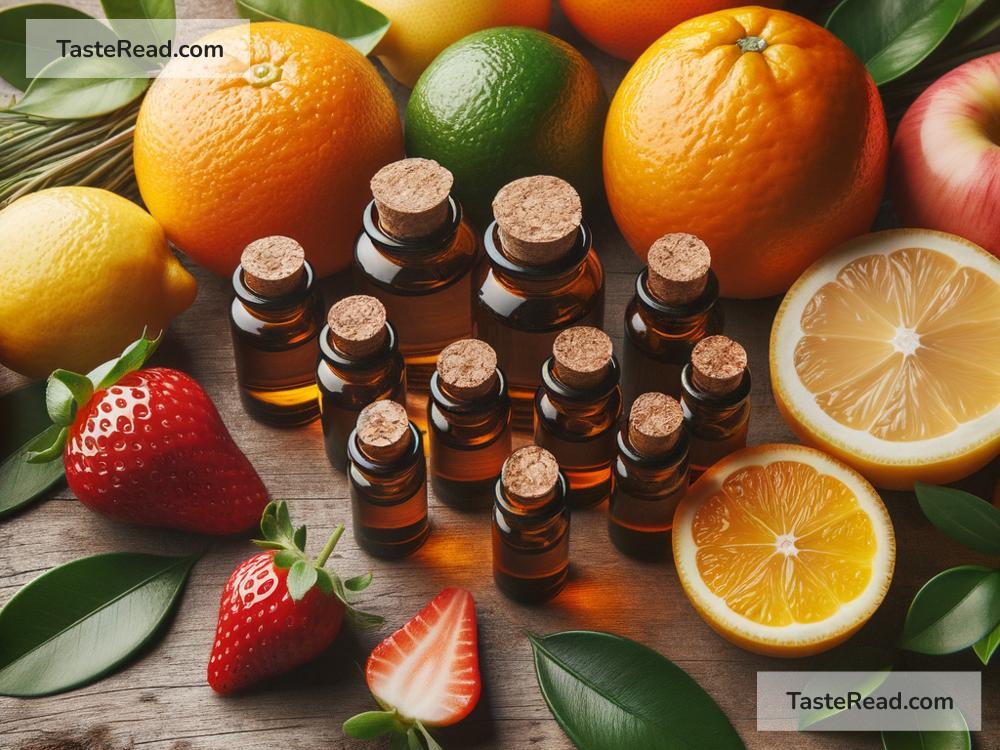The Role of Essential Oils in Fruit Flavor
Fruit flavors are delightful and refreshing, bringing joy to our taste buds with their sweetness, tanginess, and delightful aroma. But have you ever wondered why fruits smell and taste the way they do? The secret lies in something called essential oils. These natural compounds play a big role in creating the unique flavor and scent of different fruits. In this blog, we’ll take a closer look at essential oils, what they are, and how they contribute to the wonderful world of fruit flavors.
What Are Essential Oils?
Essential oils are natural, aromatic substances found in plants, including fruits. They are highly concentrated and packed with the compounds responsible for the fragrance, flavor, and even therapeutic properties of plants. These oils are stored in tiny sacs inside the peel, flesh, and sometimes seeds of fruits. When you smell a fruity aroma or bite into a juicy piece of fruit, you’re actually experiencing the effects of these essential oils.
For example, when you peel an orange, the zesty smell that fills the air comes from the essential oil in the orange’s peel. Similarly, when you cut open a ripe mango, the sweet aroma you notice is due to its essential oils. In short, essential oils are nature’s way of giving fruits their distinct scents and flavors.
How Essential Oils Affect Fruit Flavor
Essential oils are made up of chemical compounds like terpenes, esters, aldehydes, and alcohols. These compounds interact with your taste buds and sense of smell to create the overall experience of enjoying fruit.
- Aroma and Smell
The role of essential oils in aroma is huge. Our sense of smell is closely connected to how we perceive flavor. When you eat a fruit, its essential oils send signals to your brain through your nose and mouth. This is why a ripe strawberry or a fresh slice of pineapple smells so appetizing—it’s the essential oils working their magic.
Different fruits have different combinations of compounds in their essential oils, giving each fruit its unique fragrance. For instance, limonene is a compound commonly found in citrus fruits like lemons and oranges, giving them their fresh, citrusy scent. On the other hand, linalool is responsible for the floral aroma in fruits like peaches and grapes.
- Taste Enhancement
Essential oils also contribute to the taste of fruits. While sugar and acids in fruits provide the basic sweetness and tang, the essential oils add complexity by providing subtle flavor notes. For example, essential oils in apples include compounds that give hints of spicy, floral, and honey-like flavors. Similarly, bananas get their characteristic flavor from an essential oil compound called isoamyl acetate.
These oils help balance the different taste sensations in fruits. A mango may have a mix of sweetness, tartness, and citrusy flavor—all thanks to the interplay of its essential oils.
- Ripeness and Freshness
Essential oils can also indicate a fruit’s ripeness and freshness. Fruits that are ripe tend to have stronger aromas because their essential oils are more active. For example, a green, unripe pineapple has a milder aroma, while a ripe pineapple has a rich, tropical scent.
Over time, essential oils can degrade, which is why fruits that are overripe or old lose their fresh flavor and smell. This is why it’s best to consume fruits at their peak ripeness to enjoy their full spectrum of flavors.
Essential Oils in Fruit Products
Essential oils aren’t just important for fresh fruit; they also play a role in processed fruit products. You can find essential oils in juices, candies, jams, and even perfumes and cosmetics that mimic fruit scents. For example, lemon essential oil is often used in lemon-flavored candies and beverages to enhance the citrusy taste.
Food manufacturers and chefs use essential oils, both natural and synthetic, to replicate or boost fruit flavors in recipes and foods. A drop of orange essential oil can make baked goods taste more vibrant, while strawberry essence adds a fruity punch to smoothies and desserts.
How to Use Essential Oils at Home
Luckily, you can also use essential oils to bring fruit flavors into your own kitchen. Some essential oils, like lemon, orange, or coconut, are safe for cooking when properly diluted. A few drops can make a big difference in enhancing the flavor of a dish or drink.
For example, you can add a drop of lemon essential oil to a cake batter for citrus flavor, or mix orange essential oil into homemade salad dressings for a fruity twist. Always read instructions carefully, and make sure you’re using food-grade essential oils, as not all essential oils are safe to eat.
The Wonders of Essential Oils
Essential oils are truly fascinating. They are nature’s way of giving fruits their unique flavors and aromas, making them the delicious treats we love. From the tangy zest of a lemon to the tropical sweetness of a mango, essential oils play a big role in creating these experiences. Whether you’re enjoying fresh fruit or using fruit-flavored products, take a moment to appreciate the essential oils behind the scenes. They’re tiny, but they make a big difference in how we experience the wonderful world of fruits!


